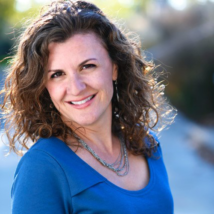
Science writer Jenny Cutraro spent her elementary school years bringing home report cards declaring her to be “too talkative during class.” Today, she channels that love of talking into a career that’s all about sharing science with others. She’s the founder and director of Science Storytellers, a public program that puts kids in the role of science journalists. A longtime contributor to Science News Explores, she also has written for The Boston Globe, The LA Times, Science, National Geographic News, and other outlets. At WGBH in Boston, she developed an award-winning collection of education resources for the Emmy-nominated PBS KIDS series Plum. Landing. She also has produced science education resources for PBS Learning Media, NOVA Science NOW, and The New York Times Learning Network. Jenny has a B.A. in biology from Carleton College in Northfield, Minn., a M.S. in biology from Purdue University in West Lafayette, Ind., and studied science journalism at Boston University in Massachusetts. A Midwesterner at heart, Jenny hails from Milwaukee and now lives in the Boston area with her husband, their daughters, and two small furry carnivores that meow an awful lot.

All Stories by Jennifer Cutraro
-
 Chemistry
ChemistryPlastic-munching microbes
Microbes may soon help make it easier to recycle your soda bottle, helping to create new demand for what has historically been a low-quality recycled material.
-
 Agriculture
AgricultureFarms sprout in cities
The farms of the future may be where you would least expect to find them -- in towering skyscrapers in some of the world's largest cities.
-
 Planets
PlanetsThe trouble with Pluto
The traditional view of the solar system is out of date. Depending on who you talk to today, the answer to how many planets there are could be eight, 12, or even 208 and counting.
-
 Brain
BrainGirls are cool for school
Preschool boys perform better in classes where the girls outnumber them.
-
 Planets
PlanetsThe two faces of Mars
A single impact might explain why the Red Planet’s surface looks smoother in the north and rugged and rocky in the south.
-
 Planets
PlanetsPluto, plutoid: What’s in a name?
In 2006, an international organization changed the classification of Pluto from planet to "dwarf planet."
-
 Health & Medicine
Health & MedicineHey batter, wake up!
Baseball teams that travel across the country may be at a disadvantage when they play.
-

-
 Humans
HumansFakes in the museum
A close-up examination of crystal skulls reveals the true, recent origins of these "relics"
-
 Health & Medicine
Health & MedicineGut microbes and weight
A new report links a baby's gut microbes with the chance that the baby will become an overweight child.
-
 Earth
EarthSalty, old and, perhaps, a sign of early life
Exploring salt deposits, researchers unearthed the planet's oldest-known, complete molecules thought to have been made by living things.
-
 Tech
TechUndercover detectives
T-rays are digitally uncovering everything including potential terrorists, buried images on church walls, and subsurface flaws in the foam used to protect space shuttles.